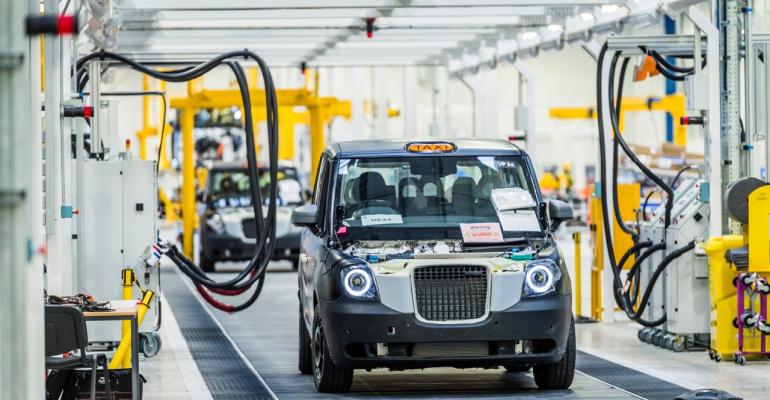The U.K.’s first assembly plant dedicated solely to the production of range-extended electric vehicles opens in Coventry, building the world’s first purpose-built, mass-market electric taxi.
The London Taxi Co., a wholly owned subsidiary of Chinese automaker Geely, spent more than £300 million ($373 million) on the plant 95 miles (153 km) northwest of London and the next-generation London taxi, which is being be built there for export around the world.
It’s a radical transformation for LTC, which has manufactured the black cab in the U.K. for 69 years, as the all-new EV goes on sale in London in the fourth quarter of this year and globally in early 2018.
The plant, which employs more than 1,000 people, including 200 engineers, has a capacity of more than 20,000 vehicles a year.
LTC says its new vehicle will be highly competitive and have substantially lower fuel costs than its previous taxis.
The taxi uses Geely-owned Volvo Car’s electric powertrain system technologies and components on a new EV lightweight platform, but retains the iconic London taxi design recognized around the world. Further derivatives of the new EV architecture will follow, LTC says.
The design ensures the new taxi retains its traditional key features including being wheelchair-accessible, having a high level of maneuverability and a spacious cabin area with six passenger seats.
LTC says vehicles produced at the new plant will be put through the most stringent testing regimen in the company’s history. Each test vehicle will cover 312,500 miles (500,000 km), often in extreme conditions, to ensure no city is off-limits.
CEO Chris Gubbey says the launch of the plant marks the rebirth of LTC, with a singular global vision of designing and building dedicated urban commercial vehicles that can operate emissions-free in cities and reduce operating costs for drivers.
The factory will also be a R&D center for EV powertrains and lightweight aluminum body structures.
LTC Chairman Carl-Peter Forster says the opening of the plant set a number of records.
“It’s the first brand-new automotive manufacturing facility in Britain for over a decade, the first dedicated electric-vehicle factory in the U.K. and the first major Chinese investment in U.K. automotive,” he says in a statement.
The plant’s environmental credentials include 9,150 sq.-ft. (850 sq.-m) of photovoltaic solar panels to power the factory and 20 charging points for EVs.
Zhou Jianqan, general manager, Geely commercial vehicles, says the EV plant gives LTC and Geely the chance to lead the way in advanced U.K. manufacturing to solve the pollution challenges facing the world’s major cities.
“Urbanization continues around at such a pace with more than a billion new city dwellers expected by 2030,” Jianqan says. “This move to cities will only be sustainable if all vehicles, including taxis, go electric. Our vision is to help solve the pollution crisis, not as an add-on, but as a company dedicated to meeting the needs of commercial drivers and their passengers.”
The opening of the plant comes ahead of new U.K. restrictions on taxis. After Jan. 1, all taxis licensed for the first time must be zero-emissions-capable – emitting no more than 50 g/km of carbon dioxide with a minimum 30-mile (48-km) zero-emissions range. A zero-emissions-capable taxi must run on gasoline if it is powered by an internal combustion engine.
LTC says Transport for London and the U.K. government are expected to provide grants of up to £7,500 ($9,330), through the Office for Low Emission Vehicles, toward the purchase of a purpose-built ultra-low-emissions taxi.





